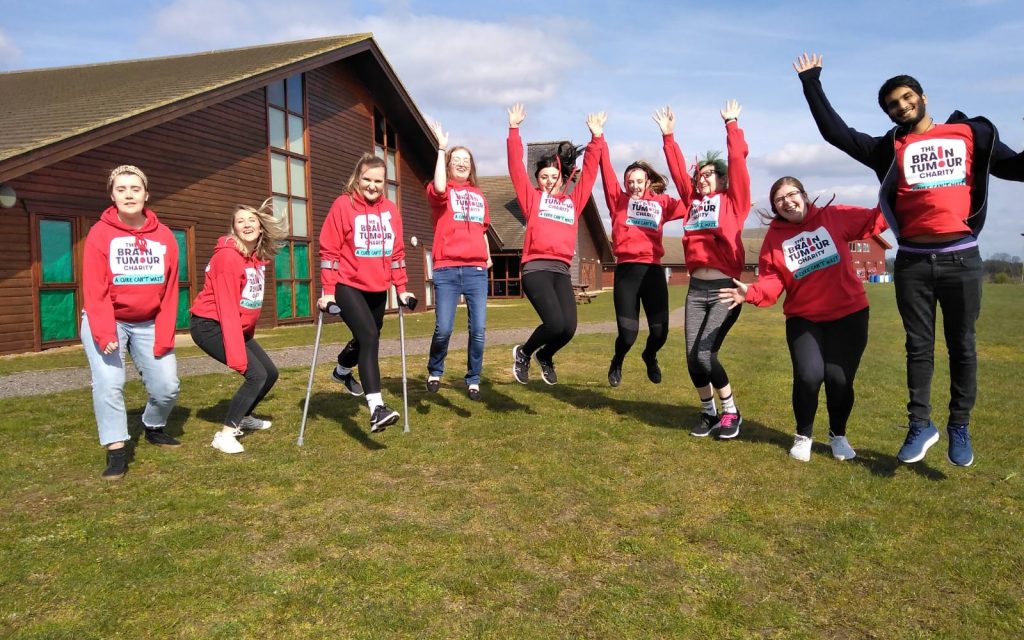Emma was diagnosed with a brain tumour aged just 21. Like many people affected, Emma began to feel lonely and isolated, struggling with her diagnosis. Then she discovered our Young Adults Service. Now, Emma shares how the service helped her and how she’s giving back to help others affected as a Young Ambassador.
“I was diagnosed with a brain tumour in 2015 and had two operations and a six-week course of radiotherapy. The clinical care I received was excellent, but I was only 21 and treated in an adult hospital where most patients were much older than me, so I was really lonely.
Eventually, I was discharged from hospital but the feeling of isolation didn’t end. While I was recovering I slept a lot, so I wasn’t going out and doing anything. It was nice being at home, in a familiar environment, but I still felt lonely.
Then in 2017, while doing some research online, I came across The Brain Tumour Charity’s website. I liked The Charity’s Facebook page and then found out about the Young Adults Service, and joined their Facebook group just for young adults (aged 16-30) too.
The Young Adults Facebook Group is great, if you have any questions people are always willing to help and offer their advice. After all it’s more than likely someone else in the group will have experienced the same thing at some point. You can ask questions and don’t feel silly.
And, if someone asks about treatment, insurance or medication, someone has an answer straight away. When I was first diagnosed I was going to my clinical team with my questions, but sometimes it’s a long wait until you see them again and there isn’t that same focus on emotional impact like at The Charity.
The Young Adult Service also have ‘meet up’ events. These are held all over the UK and allow young people with a brain tumour (now or in the past) to socialise with others who understand.
My first meet up was in Liverpool, not far from where I live. I was nervous and had never done anything like it before. You can bring a plus one, but I decided to go by myself and just throw myself in. We all met up and went paintballing together before going out for a meal at Trattoria 51. It was great, just going and being with people who ‘’get it’, and I went home already looking forward to the next one.
I really enjoy the meet ups because they remind you that you’re not alone and help you feel less isolated, like I did at the start. You get chatting to someone and you’ve got that shared experience.
It’s refreshing because you can talk to friends and family, and they can support you, but they’ve not had the direct experience. So, they can’t fully identify with what you’re going through. The meet ups give me that extra support. It’s a great place to forge friendships and get support.
The Young Adults Service also helped me see it’s not always as bad as it may feel when you’re first diagnosed. Before you were diagnosed you had an idea of where you were going and then this diagnosis throws a spanner in the works. But there are positives, even if it doesn’t feel like it straight away. It changes your perspective on life. I’ve become more resilient. And the team have given me a lot of additional, one-to-one support too. For instance, helping me tackle feelings of isolation, find employment and financial support and providing emotional reassurance.
And with the Young Adults Service I can now help others. I’ve recently become a Young Ambassador for The Charity and am looking forward to helping others, supporting future fundraising events and raising awareness of brain tumours.
The Young Adults Service has been a brilliant source of support for me – I only wish I’d discovered it sooner!”

Join our Young Adults community
Find out more about the Young Adults Service and how you can get involved.
Support and Information Services
Research & Clinical Trials Information
You can also join our active online community.
